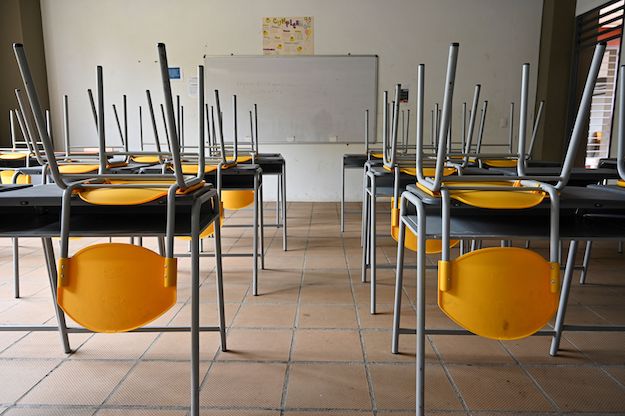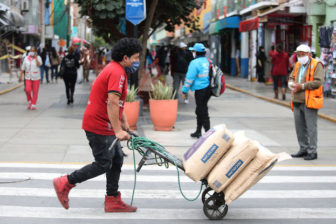This article is adapted from AQ’s special report on fighting the effects of the COVID-19 pandemic. See all 5 Big Ideas for recovery here:
Guarantee Income | A New Trade Push | Universal Health Care
Not Just GDP | Keep Kids in School
BOGOTÁ – Despite the crisis, or maybe pushed by it, we have the opportunity to help our young people realize their full potential — by doing what it takes to keep them in school.
Youth unemployment was already plaguing Latin America before the pandemic hit. The share of youth not in education, employment or training across the region was over 20% in 2019. A closer breakdown by gender reveals that nearly 30% of young women between 15 and 29 are neither in school nor employed.
Download our 5 Big Ideas special report as a PDF
The pandemic is exacerbating the unemployment situation and pointing us towards a profound social and economic emergency. The number of unemployed workers is expected to rise to 41 million people across Latin America by the end of 2020, compared to 26 million before the pandemic. Young people are faced with two unappealing options upon graduating from high school: enter an impossible job market or try to finance a higher education degree.
Education is the best employment for a young person. In Latin America, a student with a higher education degree will earn more than twice as much, on average, as a student with a high school diploma. The cost of university dropouts is also extremely high for our societies. Governments in the region spend around 1% of GDP on supporting higher education. When students don’t complete their degrees, society loses at least part of the return on their investment. Preventing students from leaving the classroom must be a central component of an emergency employment plan.
In Colombia alone, around 1 million young people may have to drop out of higher education and job training programs for financial reasons.
Although Latin America has seen a positive story in the uptake of higher education in the last two decades, with enrollment doubling, on average, across the region between 2000 and 2013, less than half of students actually complete their degrees. Many students cite economic pressures, leaving them no choice but to quit school and begin working in order to support themselves and their families.
Now, with the pandemic, many students have seen their families lose all their income and are left without the means to support enrollment fees or even to pay for reliable Internet service to attend online classes. In Colombia alone, around 1 million young people may have to drop out of higher education and job training programs for financial reasons. The picture is similar across the region. Our social contract must include a sociopolitical commitment to provide students and their families a viable, fiscally responsible support plan.
“Students first”
To accomplish this goal, governments should offer a subsidy for economically vulnerable students enrolled in higher education and trade schools. An initial pilot program could target students who lost jobs or whose families lost income due to the pandemic. Students who demonstrate that their income or the income of their families are not sufficient to continue studying as a consequence of the loss of employment due to the crisis would be eligible. The emergency plan would cover two semesters of enrollment fees and include a stipend for transportation and meals.
This may be an ambitious undertaking, but if we imagine this plan in Colombia, the numbers show us it’s feasible. A tuition subsidy that serves 1,475,000 students for two semesters would require an investment of 2.6 trillion pesos ($712 million), a figure that represents 6% of the 2020 government education budget, or less than 9% of the budget for the pandemic emergency plan. Funds would be managed by the Ministry of Education, with frequent reports and data continually available for monitoring by civil society. This accountability is key in gaining public trust for the program.
By preventing students from dropping out, we can avoid the destruction of our productive capacity, and activate a knowledge economy.
The plan is an opportunity to protect our youth, their families, and the human and social capital of our nations. By preventing students from dropping out, we can avoid the destruction of our productive capacity, and activate a knowledge economy.
When the pilot proves successful in keeping young minds engaged in their education, we can push forward to the second phase: a private-sector fund to further support underprivileged students. While low-income students’ access to higher education has increased in the last two decades, these gains are at risk of disappearing due to the pandemic. The private sector can help provide access to tech training programs, directly investing in the education of their future skilled employees. It is also critical for governments to invest in tech education programs to equip students with the skills needed for new jobs that require digital skills.
This investment would bring structural change to our economies — and this scheme would become self-sustainable in the medium term, as young, bright minds graduate and start to further contribute to building our societies. Keeping students in their job — that of studying — will save a generation from hopelessness, and instead raise a generation that can build the future we deserve.
—
Fajardo is a Colombian professor and politician who co-founded the Compromiso Ciudadano political movement. He is also the former mayor of Medellín and governor of Antioquia. Hernández is an associate professor of economics and research director at Universidad Javeriana in Colombia. Toro is a professor at the Universidad de los Andes in Colombia. Parra is a research fellow in Academic Analytics at The Black Puma in Argentina. Gil is a former Secretary of Education of Antioquia and current director at CESDE in Colombia. Saavedra is an associate researcher at Fedesarrollo in Colombia.







